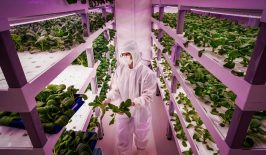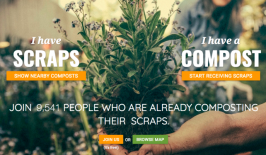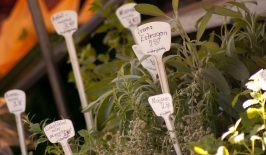Set to turn one high emission commercial building in Copenhagen into the site of a thriving urban farm, Refarmed is part of a growing movement to transform the way we produce and consume food.
Crucial as it is, agriculture and food production is one of the biggest sources of CO2 in the world. With the population and demand for food growing, the planet desperately needs a fresh new approach to food production, distribution and transportation that is less damaging to the environment. One solution is to turn urban spaces into vertical farms and use innovative, energy-saving and intensive methods to grow produce within the cities where that produce is consumed.
The concept of “building integrated agriculture,” takes this one step further. Here, high-impact buildings (meaning they produce a lot of waste and excess heat) are topped with leafy rooftop greenhouses that turn all that waste into value – to support low-impact food production. A symbiosis is created between the building below and the plants grown on top, and the result is healthy, fresh, local produce, lowered energy use, reduced waste and increased transparency and traceability.
Danish eco startup Refarmed is currently set to launch their first building-integrated agriculture project in Copenhagen – a farm located on the roof of a shopping centre in Copenhagen, growing greens that will be sold in the supermarket directly below.
Joah Illum Pinje, communication and marketing manager at Refarmed took some time out to talk to RESET about the future of the project, the benefits of using a circular approach and how much CO2-savings of Refarmed’s lettuces.
How did you come up with the idea for Refarmed?
My partner and I (Camilla Enge the co-founder of Refarmed) were frustrated with the lack of quality and sustainability in the food industry, and wanted to found a startup that promoted local food production and worked with local resources. We applied for funding and received money to carry out a research project that focused on developing an industrial symbiosis between a rooftop greenhouse and a shopping centre in Copenhagen. The feasibility study we carried out showed that we could use residual heat and biowaste from the building below, as well as solar power from panels, and rainwater, to support the production of the plants in the greenhouse. We would then be able to sell that locally-grown food in the supermarket just two floors below.
Who do you have in your team?
Camilla and I have developed a scalable business model for this kind of building-integrated agricultural production. We also have a project manager on board who is working on a IT-project, while I’m also running a pilot project with a local producer of microgreens and Camilla is busy preparing larger scale projects together with other commercial partners. E.ON Denmark is on board as an investor and the innovation director there is the chairman of our board. The other member has 40 years of experience in the retail industry.
What stage is the project at right now?
We’re currently preparing the launch of our first project, a 500 metre square farm on a roof terrace on the Field’s shopping centre in the Ørestaden district of Copenhagen. We have received the building permit and right now we are waiting for a green light from the owners of the shopping centre so that we can start implementing our pilot project.
What kinds of waste products will you be reusing exactly?
Residual heat, local waste/rainwater and composted biowaste. Excess heat from the Bilka supermarket will heat the greenhouse throughout the year and rainwater will be used to irrigate the plants and also supply an aquaponic production of fish and plants in the future. Bio-waste from a restaurant downstairs will also be used to create compost.
What kind of foods are you producing? And how much of it?
We’re growing lettuce, herbs and microgreens. In the future we will expand to include other products – fruits and vegetables, and fish too. The crops will be sold locally, particularly to local supermarkets, hotels, restaurants etc. The production is scalable and we have calculated that a 400 metre square greenhouse can produce 160,000 units of lettuce and 180,000 units of herbs.
The shopping centre was very interested from the very beginning. There has also been such a huge amount of interest in our production among the local community that we have actually managed to sell all of our crops – via a pre-sale agreement with the supermarket and a hotel chain – before even having produced our first lettuce!
What’s next for Refarmed?
Besides the shopping centre, we have a number of other projects in the pipeline. They include wholesalers, a large hypermarket, a large chain of catering companies and a chain of industrial laundry companies. Those kind of businesses are ideal for this kind of urban agriculture project because the buildings have high levels of waste heat and water. And also because of the existing infrastructure, which means that transportation is reduced. In the case of the laundry company, for example, they deliver laundry to hotels and that kind of thing, and in the future they’ll be able to deliver herbs and lettuce along with the laundry too!
This article is part of our series Sustainable Economies and Environmental Protection with the Circular Economy, which is supported by the BMW Foundation.
To find all of our articles about futureproof, sustainable agriculture, click here.






